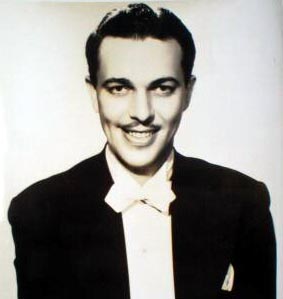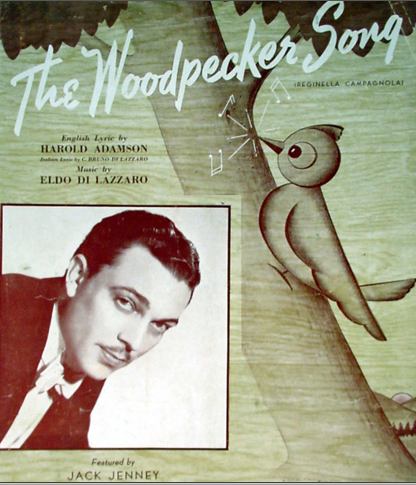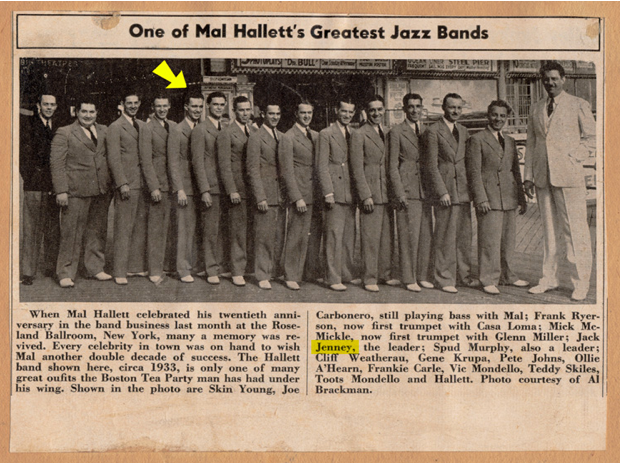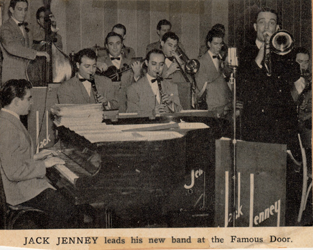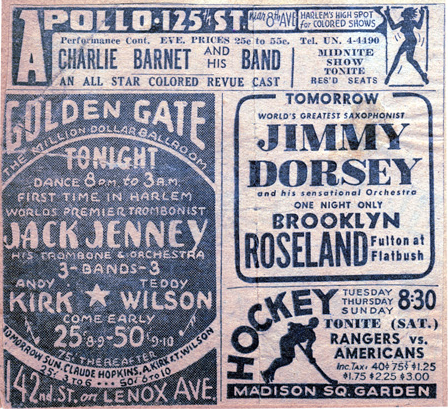Encyclopedia Dubuque
"Encyclopedia Dubuque is the online authority for all things Dubuque, written by the people who know the city best.”
Marshall Cohen—researcher and producer, CNN
Affiliated with the Local History Network of the State Historical Society of Iowa, and the Iowa Museum Association.
JENNEY, Jack
JENNEY, Truman Eliot "Jack" (Mason City, Iowa, May 12, 1910– Los Angeles, California, Dec. 16, 1945) Musician. Jenney, a jazz trombonist who was best known for instrumental versions of the song Stardust, was one of the United States' top musicians of the 1930s and 1940s. Christopher Popa, in an article for Big Band Library.com, quoted jazz critic and author Leonard Feather as saying Jenney was known "for the quiet beauty of his tone and style on sweet melodic variations, of which 'Stardust' was the most extraordinary example."
Born in Mason City, he moved to Dubuque with his family in 1910. His father taught music at COLUMBIA COLLEGE. Jack attended PRESCOTT ELEMENTARY SCHOOL and FRANKLIN SCHOOL. Jenney played with his father's band from age eleven. He first played professionally at the age of thirteen with "Art Brown and his Novelty Boys," a Dubuque JAZZ band before spending three years at Culver Military Academy in Culver, Ind.
Jenney's first professional work was with Dustin Wylie in 1928. He was hired by the Isham Jones Orchestra in 1932, and for recording sessions by Red Norvo and Glenn Miller in 1935. He went on to work with Artie Shaw, Mal Hallett, and Fred Waring's Pennsylvanians. Jenney appeared in the film Syncopationand won the Down Beat Reader's Poll for trombone in 1940.
Jenney was one of two trombonists (the other was Jack Teagarden) who played as part of the Metronome magazine all-star band, which recorded King Porter Stomp for Columbia on February 1, 1940. In 1939-40 Jenney led his own band for a year which included Peanuts Hucko, Paul Fredricks, and Hugo Winterhalter. Although this band received good reviews, it was a financial failure.
By the summer of 1940, Jenney gave up his band and accepted a position with Artie Shaw's orchestra. Shaw disbanded the group in the spring of 1941, but when he organized another large band that August, Jenney re-joined him.
Jenney briefly worked with Benny Goodman's band around the end of 1942 and the start of 1943. He was drafted and served in the Navy during WORLD WAR II. He appeared in such movies as "Second Chorus" (1940), "Syncopation" (1942) and "Stage Door Canteen" (1943), performing in the latter with the Benny Goodman Orchestra.
Jenney settled in California to do studio work, but developed kidney trouble and died a short time later.
On April 19, 2007, the Iowa Senate approved a resolution making the trombone Iowa's “premier instrument.” Singled out were Glenn Miller and Jack Jenney.
In remembrance of his accomplishments, a "Jack Jenney Music Festival" was held on June 9, 2001 in Dubuque, Iowa at EAGLE POINT PARK. The event was developed by the DUBUQUE SYMPHONY ORCHESTRA and the music department of the DUBUQUE COMMUNITY SCHOOL DISTRICT. Other fests took place annually at least through 2004.
We thank Paul HEMMER for the use of the following images illustrating the life of this gifted musician.
---
Source:
Des Moines Register, http://www.desmoinesregister.com/article/99999999/FAMOUSIOWANS/812280321/Jack-Jenny


